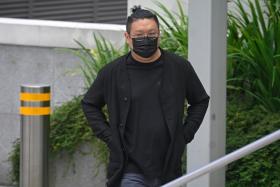Avoid putting pressure on judges in sentencing: Shanmugam
The public should avoid putting pressure on judges in sentencing, said Home Affairs and Law Minister K. Shanmugam, referring to the outcry over the case of a waitress who died after daily beatings by her flatmates.
In a Facebook post yesterday, Mr Shanmugam said many Singaporeans, including himself, were outraged by what had happened to Miss Annie Ee, 26.
But he was "troubled" by how some had reacted to the case, he said, citing an online petition seeking harsher sentences for the flatmates and the aspersions cast on the defence lawyer's character.
Said Mr Shanmugam: "As a society, we have to try and avoid putting public pressure on judges to impose harsh/lenient sentences. We have a well-functioning court system. We must have the confidence that our judges will do the right thing.
"The sentence that a defendant gets, in any particular case, must not depend on how the public react during the case."
On Dec 1, Tan Hui Zhen, 33, was sentenced to 16½ years' jail, and her husband Pua Hak Chuan, 38, was given 14 years' jail and 14 strokes of the cane.
They had pleaded guilty to charges for the extensive torture over eight months of Miss Ee, who had intellectual disabilities.
A spokesman for the AGC said on Monday that the offences of murder and culpable homicide cannot be proven against the couple as they "did not intend to cause Annie's death, and the injuries they inflicted would not ordinarily cause death".
In his post, Mr Shanmugam also responded to criticism of the defence lawyer, Mr Josephus Tan from Invictus Law.
"A lawyer has the duty to put forward the strongest possible arguments, on behalf of his client, in court. It will be a sad day for Singapore, if lawyers are going to be hounded in public, for standing up in court to argue on behalf of their clients," he said.
Mr Shanmugam appealed to the public to remember that "someone known to anyone of us could be charged for any offence at any point in time".
"Rule of law means the person is entitled to have his lawyer put forward the strongest possible arguments in his favour.
"And he is entitled to have a judge decide his guilt/innocence and sentence, without the public, or anyone else influencing the outcome," he said.
"We ought to be a civilised society, observing the rule of law, while expressing our unhappiness and moral outrage when seeing such conduct as in this case."
Get The New Paper on your phone with the free TNP app. Download from the Apple App Store or Google Play Store now


